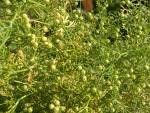Coriander - Very Beneficial Herb for Many Health Problems
Coriandrum sativum Apiaceae. Easily recognised by its distinctive scent, coriander is grown all over Europe, India and North Africa, reaching heights of up to 60cm. In early summer, this herbaceous annual is covered in umbrellashaped clusters if tiny white or pink flowers. By August, these will have given way to small, round, wrinkled seeds. Parts used
ConstituentsVery oily fruits - comprising as much as 25 per cent fatty oil - contain phenolic acids and aliphatic aldehydes, which give the plant its scent. The essential oil extracted from the seeds contains a large quantity of linalool, which is antibacterial and controls spasms. CAUTIONS
PREPARATION AND DOSAGEFor internal use TO TREAT digestive problems, diarrhoea and influenza symptoms TINCTURE Put 40 drops into a glass of water. Take three times a day. IF SYMPTOMS PERSIST CONSULT A DOCTOR Medicinal usesVarious studies have shown that nearly all of coriander's medicinal properties are due to the essential oil in the plant's seeds, which can help to regulate gastric secretions and to release trapped wind. The seeds are therefore effective in treating digestive problems, and are also recommended for common forms of diarrhoea due to infections such as gastroenteritis. Animal studies in India in 1997 demonstrated that preparations made from coriander seeds could help to lower blood cholesterol. The seeds are also believed to fight off bacterial and fungal infections. Externally, coriander seed oil can be applied to help to soothe the pain of haemorrhoids and joints affected by rheumatism. Cultivation?Coriander seeds can be sown in any type of light, well-drained soil, during warm weather, from late March to the end of April. The plant grows best in a sheltered position, exposed to plenty of sunlight. |
Ayurveda Book
This book on Ayurveda is meant for people interested to know about basics concepts of Ayurvedic healing and learn ayurveda concepts. Though there are many books Read More My SitesReal Testimonials
Connect with us |







